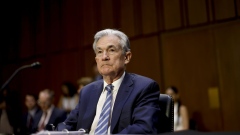Jul 3, 2019
The politicians take charge at the ECB
, Bloomberg News
Christine Lagarde's political background may not serve her well as ECB leader: Economist
The European Council has nominated Christine Lagarde to succeed Mario Draghi as president of the European Central Bank. The managing director of the International Monetary Fund has the stature and experience to take on such a crucial role for the future of the euro zone. She has also been very supportive of the steps the ECB has taken to rescue the single currency and kick start an economic recovery.
Her nomination, however, doesn’t come without risks. For a start, Lagarde is a lawyer rather than a trained economist, a trait she shares with Jerome Powell, the chairman of the U.S. Federal Reserve. She is also a former politician who served as France’s finance minister. There is a risk the central bank will now be seen as more openly political and, as a result, less independent.
Her main advantage is that she will be perceived as a continuity candidate who will follow in Draghi’s footsteps – a quality not shared by some other rivals for the post, in particular Jens Weidmann, the president of Germany’s Bundesbank. There is no doubt that Lagarde will be willing to do “whatever it takes” to preserve the euro.
She has also been very supportive of accommodative monetary policy, which has ensured that the currency union didn’t fall into a deflationary trap. Core inflation in the euro zone is still well under the ECB’s target of below (but close to) 2 per cent, and so are some of the key metrics of inflation expectations. The bloc needs an ECB president who is willing to continue to push on the monetary accelerator – and will have one.
Lagarde also has the political skills that enabled Draghi to succeed. The ECB president’s main achievement was to push through unorthodox policies such as quantitative easing in the face of initial skepticism from Germany. The IMF was heavily involved in the rescues of countries such as Greece, Portugal and Ireland – all members of the euro zone – so Lagarde knows extremely well how hard it is to build a consensus in a fractious currency union.
One area where her political acumen could be useful is in the construction of a euro zone budget. The single currency lacks a common fund to help countries facing an isolated shock. As a result, fiscal policy in the monetary union is much less effective than in the U.S., since it relies on the capabilities of individual countries. Draghi has clearly indicated the bloc would benefit from such a central fiscal capacity – a view that is shared by the IMF. Lagarde could help to push for this tool, and it could become her legacy.
Two big issues remain. There is no doubt that Lagarde has built an exceptional knowledge of the main problems affecting the world economy and formed views over what it will take to overcome them. But, unlike Draghi, she lacks the academic credentials and deep understanding of economics that are so important in this job. She will need to rely on her chief economist, Philip Lane, and on the staff of the ECB. At the IMF, she has shown herself capable of doing just that. But when the next severe crisis hits, she will lack her predecessor’s competent creativity. How well she will be able to command the respect of the rest of the ECB governing council – and of investors – also remain open questions.
There is also a much bigger question that will now haunt the ECB. In the past few years, an increasing number of former politicians have taken top positions at the central bank. The list includes Olli Rehn, the governor of the Bank of Finland, Peter Kazimir, president of the National Bank of Slovakia, and Luis de Guindos, the ECB vice president. All of them had served as finance or economy ministers before. There is a growing concern that politicians have understood the power which lies at the ECB and want to fill it in with people who are more amenable to their pressures.
There is no doubt that Draghi was political: But he did so by explaining to politicians what had to be done and why, rather than taking orders from them. There was never any doubt of who was in control. The ECB has remained fiercely independent – as it was imagined by the creators of the euro zone.
Lagarde clearly has the ability and experience to be her own woman. She will now need to show it. For all the steps taken in the past decade, the euro zone remains fragile and so is the credibility of its institutions. Only a strong and independent president can ensure Draghi’s legacy isn’t wasted.




